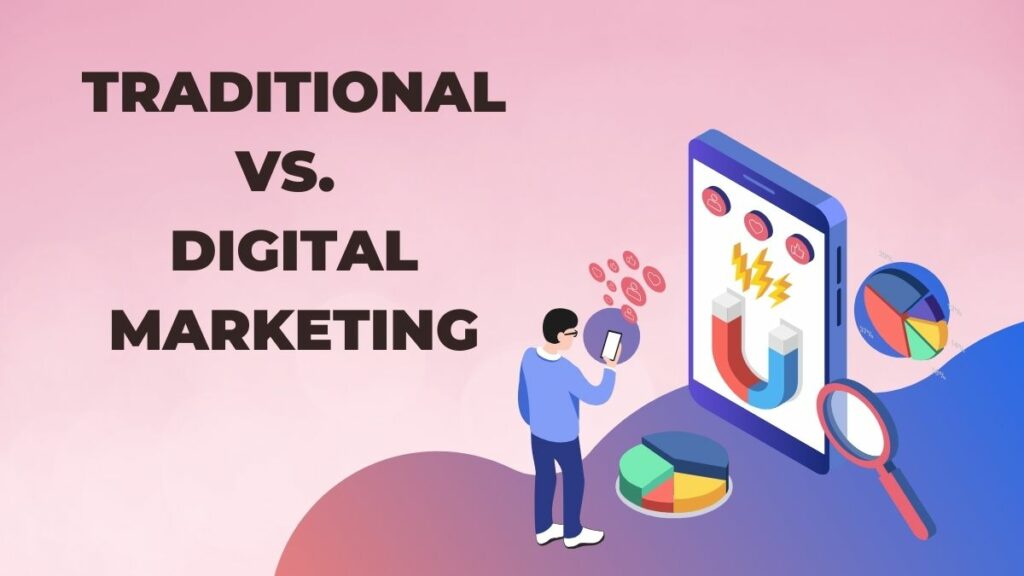Last updated on October 27th, 2024 at 08:23 pm
Traditional marketing vs. digital marketing has become a defining challenge for businesses aiming to stay competitive. As consumer behaviour shifts and technology evolves, knowing the benefits of digital marketing is necessary for any brand looking to thrive.
While traditional methods like print ads & billboards still have their place, digital marketing offers targeted, measurable, and cost-effective ways to engage customers. This blog will break down the key differences and reveal how digital marketing is transforming the future of business growth.
Which strategy will give your business the edge?
Let’s dive into the details and explore which approach might be right for your business.
What is Traditional Marketing?
Traditional marketing refers to the long-established methods of promoting products and services. These include print advertisements, billboards, TV and radio commercials, direct mail, and more. Businesses have used these strategies for decades to reach broad audiences, making them reliable choices for targeting local consumers.
Key Advantages of Traditional Marketing:
- Tangible Impact: Flyers, brochures, and magazines provide physical materials that consumers can hold, making them memorable.
- Broad Reach: Traditional advertising on TV or radio can reach a vast audience.
- Brand Authority: Well-executed print ads in reputable publications often boost credibility.
However, traditional marketing can be expensive, and measuring the exact return on investment (ROI) is often challenging. Businesses may spend large amounts on a campaign, wondering if it drives conversions.
What is digital marketing, and how is it different from traditional marketing?
Digital marketing, conversely, encompasses any promotional efforts carried out online. It uses the Internet and various online-based technologies to promote products and services, including desktop computers, mobile devices, and other digital platforms.
It includes search engine optimisation (SEO), social media marketing, email campaigns, and pay-per-click ads (PPC). Thanks to the Internet, businesses can now engage with their target audience in real time and at a fraction of the cost of traditional methods.
Benefits of Digital Marketing:
- Cost-Effectiveness: Digital marketing often offers more budget-friendly options, especially for small businesses.
- Measurable Results: Advanced analytics tools allow you to track your campaigns’ performance in real-time and make data-driven adjustments.
- Targeted Reach: You can precisely target your desired audience based on their demographics, behaviours, and preferences.
The benefits of digital marketing make it especially appealing for businesses looking to maximise their impact without spending vast sums of money. Its flexibility allows you to tweak campaigns instantly based on performance, a massive advantage over traditional methods.
Key Differences in Marketing: Traditional vs. Digital
To make informed decisions, it’s crucial to understand the key differences between traditional marketing vs. digital marketing.
Below is a quick comparison chart highlighting these key differences in marketing:
| Aspect | Traditional Marketing | Digital Marketing |
| Cost | Generally more expensive (TV, radio ads) | More cost-effective (SEO, social media ads) |
| Audience Targeting | Broad, less targeted | Highly specific, targeted |
| Measurability | Difficult to measure ROI | Real-time data tracking and analytics |
| Engagement | One-way communication (passive audience) | Two-way interaction (active engagement) |
| Reach | Local to national | Global potential |
What are the key differences between traditional and digital marketing strategies?
Traditional marketing strategies and digital approaches have their place, and many successful businesses combine them. Traditional methods can help build brand recognition, especially in local markets.
For instance, a well-placed billboard or print ad can generate buzz in a particular region. Meanwhile, digital strategies like email marketing and social media campaigns can effectively target specific customer groups, creating a more personal connection. This highlights the future of digital marketing for businesses as a more tailored and impactful approach.
-
Traditional Marketing Strategies:
- Print Advertising: Utilises newspapers, magazines, brochures, and flyers to reach local and mass audiences.
- Billboards and Outdoor Ads: Visible in high-traffic areas to capture attention from passersby.
- Direct Mail: Sends physical promotional materials directly to consumers’ homes.
- Event Sponsorship: Builds brand visibility by sponsoring sports or community activities.
-
Digital Marketing Strategies:
- Search Engine Optimisation (SEO): Optimises content to rank higher on search engines, driving organic traffic.
- Social Media Marketing: Engages audiences through platforms like Facebook, Instagram, and LinkedIn.
- Pay-Per-Click (PPC): Paid ads displayed on search engines or websites, charging per click.
- Email Marketing: Sends personalised emails to target audiences to build relationships and promote offers.
- Content Marketing: Creates valuable, relevant content (blogs, videos, etc.) to attract and engage target audiences online.
Certification in Digital Marketing: Why it’s a Game-Changer
Understanding digital marketing is increasingly valuable as the world shifts towards online spaces. A digital marketing certification enhances your skills and employability in a competitive market. With businesses of all sizes now turning to digital platforms to reach their customers, having certified expertise in SEO, PPC, and social media can open up vast opportunities.
Additionally, as digital marketing’s importance grows, it becomes more critical for businesses to blend both strategies. Certification will give you the knowledge to leverage these tools and the confidence to integrate them with traditional marketing efforts.
Elevate Your Career with Imarticus Learning’s Professional Certification in Digital Marketing and MarTech
Understanding the difference between traditional marketing Vs. Digital marketing is crucial for business growth. The real challenge lies in determining which strategy best suits your business objectives.
Imarticus Learning, in collaboration with IIT Roorkee, has designed an up-to-date Professional Certification in Digital Marketing and MarTech. This course is perfect for digital marketers looking to master essential skills such as social media, SEO, and affiliate marketing, all taught by a prestigious institution.
Take the initial step toward becoming a digital marketing expert. Enrol today and elevate your career with Imarticus Learning!

